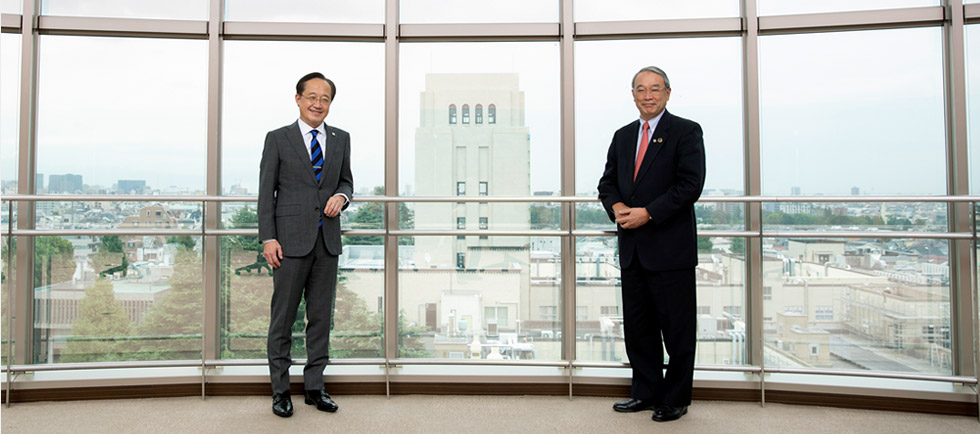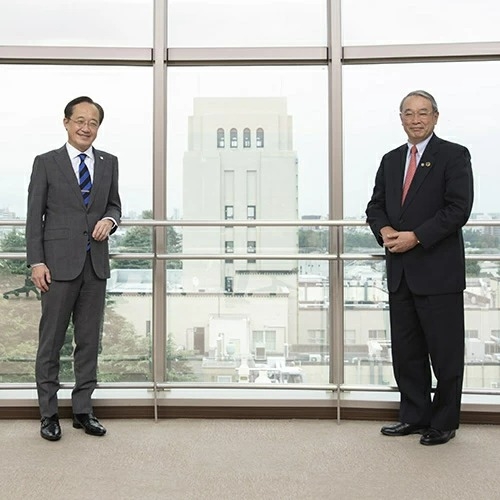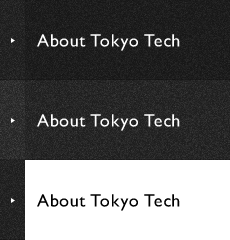Nobuhiro Endo
Chair, Council on Competitiveness-Nippon
Chairman of the Board, NEC Corporation
Kazuya Masu
President, Tokyo Institute of Technology
Jun-ichi Imura (moderator)
Executive Officer and Vice President for Teaching and Learning
Nobuhiro Matsushita (moderator)
Senior Aide to the President, Professor
The images of the moon obtained by the Apollo program makes me feel the science and technology's remarkable progress in real time. I, therefore, decided to learn about electricity and semiconductors.
—You both graduated from Tokyo Tech, what do you remember from your student days?
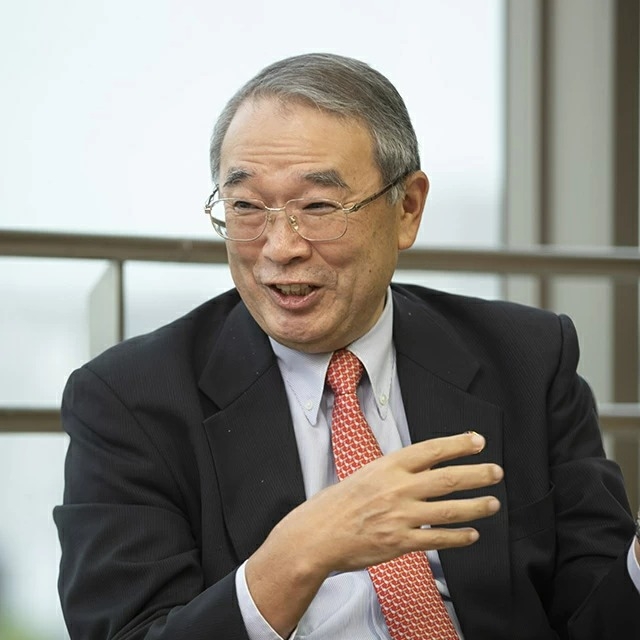
Nobuhiro Endo, Chairman of the Board, NEC Corporation
Endo : I chose Tokyo Tech mainly because a famous professor of mathematics named Kentaro Yano was giving lecture there at the time, and it's been my dream to study here.
TV broadcasts only started in Japan in 1953, the year I was born. In 1963, there was a trial satellite relay between Japan and the United States. The passing of President Kennedy was live broadcast, and I remember being shocked to view images from places other than Japan in real time. This was one reason I wanted to go to university and study radio waves. There are four Maxwell Equations, but when the two differential equations are combined, it changes to the Schrodinger equation. I thought, "Wow! The arrival of radio waves can be expressed with mathematical formulas that describe physical phenomena." That's why I chose Professor Toshio Sekiguchi's laboratory, which was known for studying electromagnetic waves.
Masu : I see. I grew up during the same time, but it was completely different (laughs).
I was born in 1954 and basically experienced the same things as Mr. Endo growing up. When the Shinkansen was launched in Japan, I saw images of the Moon from the Gemini and Apollo programs, and I listened to simultaneous translation, I also had the strong impression that I was witnessing the advancement of science and technology in real time. I began thinking about studying electricity because I was interested in invisible things, and went on to study semiconductors at university.
Universities should consider education through science and technology that provides a basis for judgment needed for value creation.
—Based on your perspectives and backgrounds, what do you think the role of universities is in Japanese society?
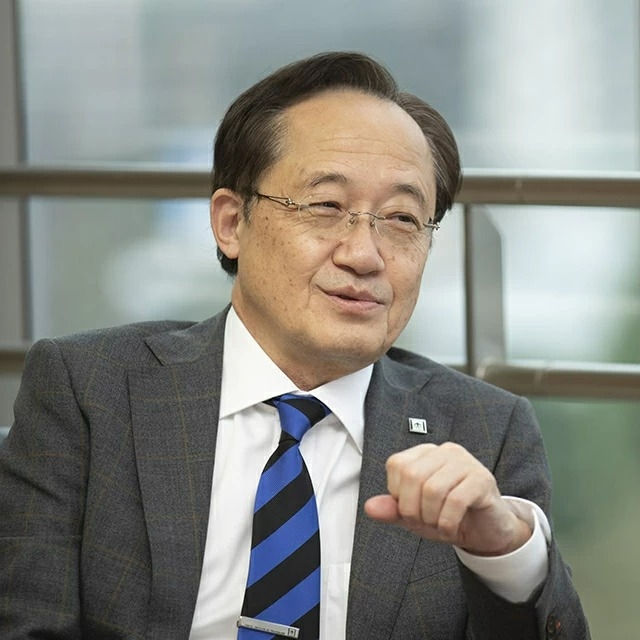
Kazuya Masu, President, Tokyo Tech
Masu : In the seventy-five years following the end of World War II, the economy grew steadily until the 1990s, but has been stagnant ever since. I believe it's because we lost the spirit of taking on new challenges. Today, it's much easier for university students to study abroad than in our day, but they still refrain from doing so. I want students to feel a desire to take on new challenges, and I want to nurture this feeling.
Endo : In a way, I feel this is also the responsibility of companies. If people view a university as a status symbol for working at some company, they are forgetting about creating value for society. If you feel you have a free pass to work for a company, your life as a student will become passive. So, companies should focus more on emphasizing the fact that they contribute to human society in a certain way. Therefore, companies should emphasize more how they contribute to human society in a particular way. In addition, students in junior high and high school should already be thinking, "I want to work for a company that thinks like me" or "that fits my personality" or "that aligns with my current thinking.
I don't think it's possible to develop the motivation and desire to create value for human society unless education first understands human society like STEM and STEAM education that includes art.
Masu : In the admission policy for high and junior high school students, under "What kind of education do we provide at Tokyo Tech," it mentions "We contribute to society," but perhaps this is not emphasized enough. In addition to the admission policy, we also have a degree and a curriculum policy, but we haven't digested these very well so far. The message that "we accept this type of person and foster them in this way" has yet to be strongly communicated to society.
Endo : The other day, I had an opportunity to hear about the National University of Singapore and how they became the number one university in Asia. Basically, they followed a British-style education system, but the biggest turning point was changing to a university that nurtures people who'll shape the future. I think "shaping the future" means "how to contribute to human society" and "nurturing people who can be leaders." In other words, it's how education responds to changes in society when education is a match for creating value in society.
I don't think the essence of Homo sapiens will change. Feathers don't appear suddenly. Such evolution does not occur simply. For instance, we must consider the future based on the premise that "human society" will change and advance while retaining Homo sapiens-specific traits such as sympathy and compassion.
Masu : We also argue that the role universities play in society needs to be better communicated. For example, Tokyo Tech's goal is to be the world's premier university for science and engineering, but that doesn't indicate how we will contribute to society. We also say, "Tokyo Tech — Creating the future," but I still felt it was important to send a message that was not directed inward, but rather from a different perspective.
When you consider the original role of the Institute, a professor in liberal arts may say, "There's some things that can't be understood by merely supporting companies and society on a daily basis for developing human grounded ability and personality. Research must be conducted and disseminated from perspectives other than just cost, efficiency, and productivity."
Endo : I think you're right! You can't narrow down the role of a university to one thing. For example, fundamental research is absolutely necessary, and Tokyo Tech is developing such human resources. At the same time, not everyone here is devoted to this type of research. We want you to also develop human resources capable of creating value. Society needs top-level universities to develop leaders. Essentially, leaders need good judgment. It's important to have your own solid basis for judgment when going out into society, and that basis is developed at university.
For people to be independent, a solid basis for judgment is needed. Each person must strengthen such basis, which is nurtured and strengthened through communication and deep discussion. I believe that education is the main aspect of that formation; it helps one to self-improve and attain independence. The foundation must be formed and strengthened while at university so that a person may contribute towards value creation in society.
Most faculty members are focused on research, so they might not have a strong awareness of fostering a student's basis for judgment. I want universities to concentrate on developing professors who focus on "fostering education and especially people."
Masu : That's exactly the point. Faculty members need to have a wide viewpoint and knowledge in areas outside their own fields. Students who engage in research under them will be able to develop a wider foundation for judgment whether they end up in academia or industry, even if they focus on a particular field of fundamental research until the doctoral program. We're focusing on leadership education for doctoral students, but in most cases, students are pursuing in-depth research in the fields of academic supervisors. Research and education need to be conducted from a wider perspective.
Negotiating overseas is the ultimate form of communication, which can widen a person’s basis for judgment
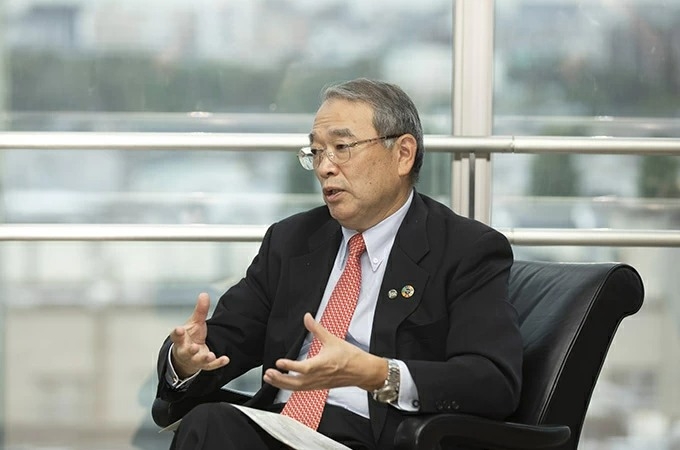
Endo : To have more foreign students here at Tokyo Tech, students first need to study abroad. Otherwise, those from other countries won't be encouraged to come. At the National University of Singapore, 65% of students study abroad and then return. By going abroad and having discussions, their basis for judgment is broadened and deepened. That's why I believe it is important to study abroad.
Masu : There are opportunities to study in other countries, so students should take more advantage of this.
Endo : I have experience working with German companies. They are very logical, but there are some areas where they refuse to compromise. Learning to negotiate in such a situation is good training and adds to one's experience. As you negotiate face-to-face, you have to decide where to compromise. You can't just decide what to give up on your own. You must listen to the other person, comprehend their situation, determine what they are willing to accept, identify what you are unwilling to give up, and then attempt to maximize the benefits for both parties. I think negotiation is the ultimate form of communication. Gaining such experience expands and deepens your foundation for judgment.
When you try to convey your intentions in another country, you will face resistance. In Japanese, it is easy to convey your ideas with ambiguous expressions, but you need to use words that convey ideas more clearly in other languages.
Masu : There are many foreign students on campus, so it's important to have more opportunities for interaction between Japanese students and those from other countries.
Endo : I also think it's a good idea to hold roundtable discussions with graduates from Tokyo Tech who are active in other countries.
Germans, the British, and Americans each have completely different ways of thinking than the Japanese. It's important to experience such diversity. Going abroad allows you to do just that, so it's extremely helpful to experience this while you're young and your mind is still curious and flexible.
Masu : Recently, people have been discussing and promoting job-type internships (requiring employment for at least two months). Originally, we were discussing implementing this for doctoral students, but now we're also talking about using it for master's students. At Tokyo Tech, it is possible to complete the bachelor's degree program in three and a half years, with effort. So, students can study abroad by making good use of the internship system during those extra six months. They can take a long-term job-type internship for about three months, which reduces financial stress, then study abroad for three months, and finally enroll on a master's degree program. This means it's actually possible to move on to a master's or even a doctoral degree after experiencing society, seeing the world, and understanding what you want to study. This will allow for the development of human resources who have solid judgment ability.
Endo : Online internships don't allow you to cultivate a sense of a field. Companies are where value for contributing to society is created, and internships allow you to understand the contact points between society and value creation. During an internship, it's important to learn whether a company is conscious of creating value for a sustainable society, what the basis of their philosophy is, what kind of process they are using, and what you need to understand most about the process.
In more advanced internships, it's possible to experience a company's value creation process, and once you see your ability to create value in such processes, you can confirm whether it is right for you. In industry and academia, I think it's good to share a clear purpose, clarify what students can learn through an internship, and then build an internship program through collaboration between industry and academia.
Currently, less than 15% of students are female. The goal is 30%
Masu : The low number of female students has been an issue at Tokyo Tech for a while.
Endo : There seems to be a lot more female students now.
Masu : Well, there's definitely a lot more compared to when you were a student.
Endo : Out of 720 students, I think only six were women during my time.
Masu : Right now, less than 15% of students who enroll in bachelor's programs are female. Even at the School of Life Science and Technology, which has the highest number, it's around 25%. For society as a whole to continue developing vibrantly, it's important that women actively participate in the field of science and technology. Therefore, we are considering taking positive measures to ensure 30% of university students are female.
Endo : I understand that Tokyo Tech is trying to have more female students, but it would be good to consider whether this is a university that female high school students want to attend from their perspective. Those interested in science, for instance, are curious about your association with Tokyo Medical and Dental University. This is especially true with life science and engineering because there are currently more businesses that are involved in mixed fields such as medical science and science and engineering, so more and more women are advancing into these fields.
Masu : It's important to convey the idea that science and engineering is a good field for female students. Notably, there are very few female students at the School of Engineering, School of Computing, and School of Science. There are some at the School of Life Science and Technology and the School of Environment and Society. Science and engineering industries often tell us that they want to hire female students. We are making various efforts and will continue to improve, but there is also a debate over whether we should do something like establishing a female quota.
Considering a system that allows people who want to do something at Tokyo Tech to enroll
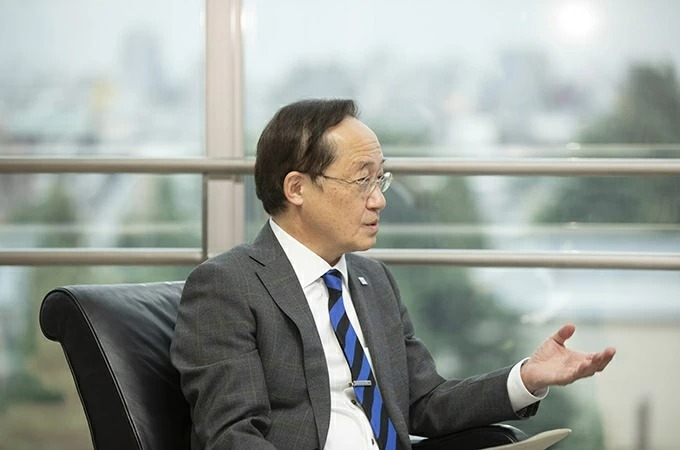
Masu : By the time a student enters high school, there are those who want to attend the University of Tokyo, those who want to attend Tokyo Tech, those who want to attend Kyoto University, and some who give up if their grades aren't good enough after three years. This means that we have to instill the idea, at the elementary and junior high school level, that science and engineering are interesting, and you should go to Tokyo Tech.
Endo : Universities should have more access to elementary and junior high schools.
Masu : I agree. The problem is that there are many girls who like science up until elementary and junior high school, but this decreases once they enter high school. This is because there are exams, and when you enter high school, humanities and sciences are separated.
Endo : Isn't it possible to take an entrance exam without a deviation value? I'm not sure whether current entrance exams fully consider true thinking, value creation, and judgment abilities.
Masu : Every year, 1,100 students enroll in the bachelor's program. About 90 are through comprehensive selection. After taking the Common Test for University Admissions, students can apply for comprehensive selection. The Test is a judgment criterion, but selection is determined based on interviews and other things.
Endo : In my opinion, it would be good for universities to provide some education to those who are interested, even during high school. I can unequivocally state that the study period for entrance exam preparation is meaningless. Overall thinking ability seems to peak at around 18. During those three years, if we could demonstrate things like quantum theory, for example, to high school students who want to improve their thinking ability, they will be motivated and grow. I believe that such education is more meaningful than simply studying to improve test scores. I want to enroll students who are eager to learn.
Masu : Exactly.
Endo : Honestly, it's almost impossible to have a test that can really determine a person's thinking process. That's why there are many test questions that can be answered by simply memorizing something. Such exams can measure the effort a student has made to study, but it doesn't necessarily showcase their abilities. Using current exams, some who really want to go to university may not be able to enroll. I think it's a good idea to eliminate exams and devise a system that allows people who genuinely want to enroll at Tokyo Tech to do so. During extracurricular activities for high school students, you should show that "studying this kind of thing is really interesting" and "understanding this kind of thing can broaden your perspective." Then, applicants who show potential should be enrolled.
Masu : For universities to develop human resources who will shape the future, diverse people need to be accepted, so I think university entrance exams should change.
We created a system called B2D (Bachelor to Doctor) that allows students to start working on research more quickly after entering the university
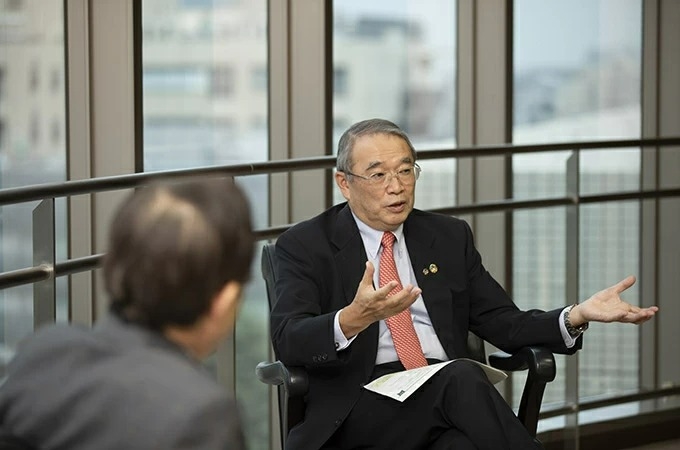
Endo : There are competent people without a degree who can be hired by a company. So, I request that personnel are able to measure an individual's abilities. If they feel a person is motivated, has basic knowledge, creativity, and communication skills, they should consider hiring them. Companies have the flexibility that is required to do this. However, our ability to evaluate people is insufficient, so this is something I want to work on with the university. As a company, I want universities to not just hand out diplomas based on credits. Rather, make students prove that they've got certain abilities.
Masu : On the bachelor's degree program, students are supposed to choose what they want to study on their own, but inevitably, it ends up being quite narrow. Through their studies based on research after moving to the master's degree program, it's possible to ensure flexible learning based on the background of their thinking.
Endo : Being able to enter the master's course or a laboratory quickly after you enter a university is good because it allows you to start learning on your own.
Masu : Yes, we're considering the things you pointed out. Last year, we created a system called B2D (Bachelor to Doctor). Selected students could begin research immediately during the second year of their bachelor's degree. Now, in the second year, there are 16 third-year bachelor's students who are already in the laboratory. This allows them to experience several laboratories and feel the thrill of research by working on their own ideas.
Endo : I think that's a great idea. Studying on your own is the most important way to strengthen your judgment foundation. A diploma is simply a certificate showing what you've learned, but what you learn doesn't necessarily strengthen your basis of judgment. A person's judgment foundation grows as they become willing to learn and construct their own theories.
—In the past, master's students were able to reach that level, but science and technology have become more sophisticated, so there are cases where a faculty member gives a theme and the person just writes a dissertation. Doctoral students are trained to find and select a research theme on their own. If they are able to explain the related paths and significance of their results to convince the degree examination judges, they can receive academic degrees.
Endo : It may be obvious, but if you could clearly show that when a person enters Tokyo Tech, there is a process for self-study, it would be possible to show that studying on their own with this process allows them to choose a better path. I think clarifying this would encourage more people. It's so important to value desire and motivation, and to show people who have this that they can make their own way forward.
At a company, if you don't speak up about something you want to do by yourself, you'll just keep doing the same work. For others to recognize what you want to do, you have to promote it.
Masu : I want students to be able to enter a laboratory, interact with professors, and then insist on the kind of research they want to do. If you start something on your own, which requires motivation and responsibility, it may not be easy, but the rewards will be great.
If national universities believe that they will not go bankrupt, they won’t make effort
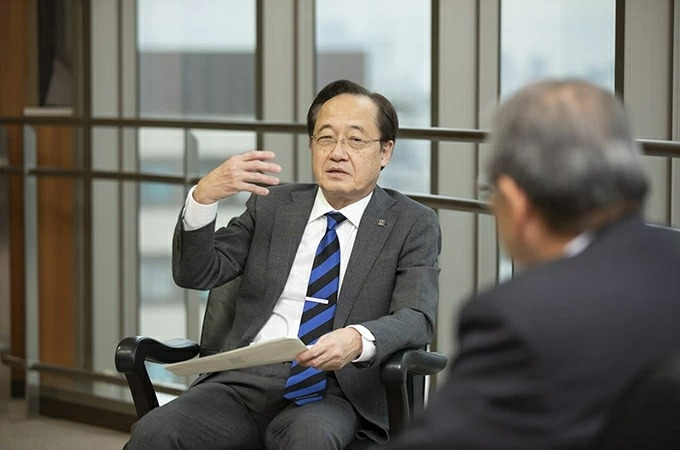
Masu : I always try to think about things from a broad perspective, and even though this is what I say to other people, based on what I've said today, I once again realized that my ideas are based on a university perspective.
Endo : In the case of national universities, I think this is because MEXT establishes a framework, and then you have to operate within it.
Masu : Having a framework is good, but whenever you do something or try to do something, it's evaluated, normally using a deduction method. But this is the opposite of telling students to improve their good points. I think if just that would change, it would be completely different. With a positive evaluation, the university as a whole would be able to take on more challenges.
Endo : Actually, it may be important for universities to become financially independent.
If you get too comfortable as a national university, you may end up as one that doesn't put in the required effort. For companies, continuity is essential. Since companies contribute to the sustainability of society, we must continue to exist in order to contribute. National universities cannot go bankrupt. But if that is the premise, you'll stop putting in the effort. Organizations are not active, they resist change, and are reluctant to embrace it.
Masu : Along with students, Tokyo Tech faculty and staff recognize that, as a university, we contribute to society through science and technology, and we understand that the latter will advance as technological innovations are born. So, in that sense, I think we've got a higher tolerance for change. It is also true that national universities have a sense of security in the belief that they will never shut down.
Tokyo Tech was selected as a Designated National University Corporation in March 2018, but we view change in a much more positive way. In particular, we’ve got an awareness surrounding the issue of whether we can succeed based solely on the budget provided by the government. Strengthening education and research based on an awareness of our connection with society has been promoted through the redevelopment of the Tamachi Campus due to revisions in the legal system. The redevelopment itself was viewed very positively.
Endo : Being active is extremely important. By taking advantage of the fact that the Tamachi Campus is close to Shinagawa Station, you might be able to provide a place for discussions with people from local universities, or even create one for conducting temporary experiments.
Masu : As well as for education and research, we plan to use the redeveloped Tamachi Campus (scheduled to be completed in 2031) as a 10,000 m2 incubation area.
Endo : In terms of fostering entrepreneurship, I hope you can set up several places for co-creation between companies and Tokyo Tech at Tamachi, and it'd be nice to take advantage of its location by allowing it to be used as a base when people visit Tokyo from a local university. I think Tamachi Campus should be a place where people come together. Great things are created when people collaborate.
Masu : As you pointed out, we keep in mind that the Tamachi Campus will be a place for working with society, and it'll not only be open to Tokyo Tech, but also to many universities.
However, redevelopment will be completed in 2031, 10 years from now. The buildings in Midorigaoka must first be dismantled, the attached high school moved from Tamachi, then the buildings in Tamachi taken down, and finally new buildings constructed, so it's going to take time.
Since we have project expense revenue from the redevelopment of Tamachi (4.5 billion yen per year from 2026, 75 years), we'll also redevelop the Suzukakedai Campus by issuing university bonds. We should be able to begin redevelopment of the Ookayama Campus, which is becoming too cramped, by making it possible for students to move from Ookayama to Suzukakedai. This'll be an opportunity to make big changes on the campus, and mark the start of the "3 Campus Innovation Ecosystem Concept."
These next 10 years toward our 150th anniversary will be a "preparatory period for a leap forward," allowing Tokyo Tech to transform into a university that will continue to grow for the next 100 years.
—Thank you both very much for your time today.
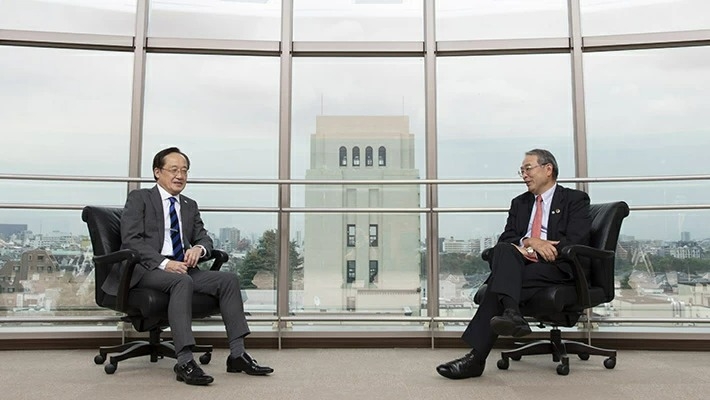
The Special Topics component of the Tokyo Tech Website shines a spotlight on recent developments in research and education, achievements of its community members, and special events and news from the Institute.
Past features can be viewed in the Special Topics Gallery.
Interview held in September 2021
. Any information published on this site will be valid in relation to Science Tokyo.


